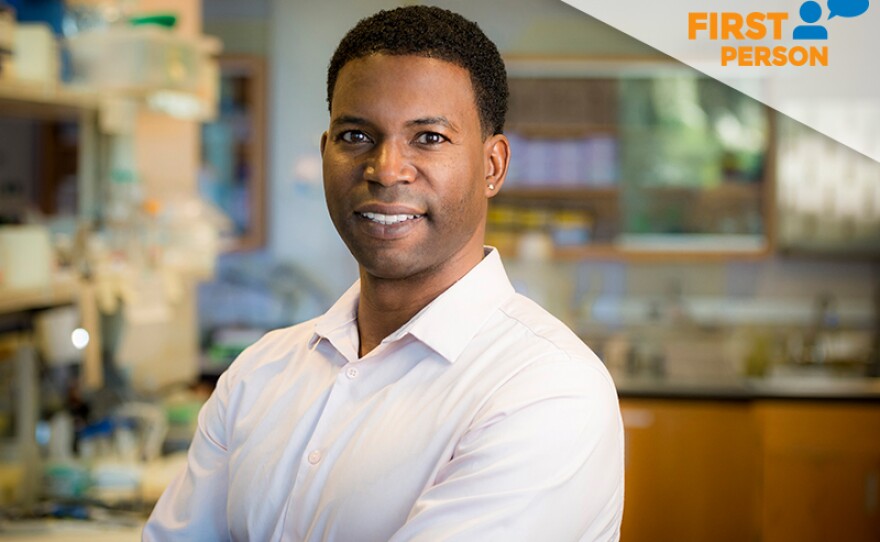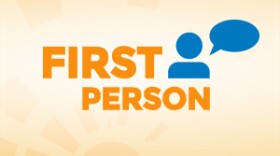The number of students who are the first in their families to go to college is on the rise on the University of California campuses. Disposing a new challenge for the system. First-generation students are less likely to graduate. That is why UC San Diego this year launched a program. Professors are reaching out and sharing their stories. Meghan Burk brings us a story for our first-person series.My name is Gentry Patrick and I'm a professor in the division of biological science. I'm also a director of mentorship and diversity for the division of biological sciences. I had not predicted that I would be a professor here today neuroscience. Part because my mother had met 16 years old and grew up in south-central LA. I was the first to go to college and my family. No one knew about science. I did not have friends of the family to emulate and ask questions about. There's not a single scientist in my family. For me, just this interest in learning was fundamental. If I had not had a true passion for the learning process in general, I think that I would have not be on this trajectory. There is a lot of students and a lot of kids who have that true passion for learning so the question is how do we maintain that? For me I look back in my life and it was having these amazing mentors and high school. Outside of high school my mother very young had me at such a young age but she was extremely dedicated to me getting a good education. She consistently talked about using education that is only way that you're going to be able to get out of this. I got to Berkely in 1988. I gained a temporary employment for the employment development Department. I just had a little summer job and my job was to provide summer work for them. It just so happened that my job came along for a research lab. I set myself on the interview. I don't think you're supposed to do that but that's what I did. I got the job and the guy was a professor at UC Berkeley but he owned a private company and I was working in his private company so I was working in a research lab and was able to get paid. That began to provide some stability in my life. The very important part of the trajectory and my success was being accepted into a terminal Masters program at UC San Francisco. I applied to this program and it only takes two students a year, and I had to spend an hour on the phone convincing the lead professor who run the program that he should take a chance on me. He said you have such good scorers in -- but your grades are poor which makes us think you are lazy. I said there's a reason I had to work, I did not have good study skills and I had a lot of things that I had to attend. I could've just given up and said okay, I guess I will try something different. But I assured him that he should give me a shot and that he would not recredit. We joke to this day that what if I just said no. This would all be -- we would not be here today. That is a great example of someone looking beyond the grades and making sure that the capacity for successes there but looking at all the other aspects.Somehow we had to not squash the potential that a student has because they're coming from a poverty-stricken neighborhood or school that may not have [ Indiscernible ] courses. Some provide them with the playbook in a platform to be just as successful as anyone else because the student have the students have a sense of family where they know that they are being dependent on. It's very important that I keep up on my science. At the same time, I'm very interested now making sure that access for students from diverse backgrounds is a prominent goal in mind. I want my colleagues to see that the minimal effort they can make such a big difference in the lives of students. A lot of time you spent an hour with them in that might be fundamental to them choosing to stick to a coarser move on. I love interacting with them. It's been a pleasure to do that.That was Gentry Patrick. He will speak at a forum on campus Thursday and next year will launch a program called paths is to help underrepresent the students and excel in science. Meghan Burk brought us that first-person feature.
According to Gentry Patrick, you could not have predicted he would become a professor.
“In part because my mom had me at 16 years old,” Patrick said. “I grew up in inner-city, South Central (Los Angeles). I was the first to go to college in my family. Nobody knew about science.”
Patrick is now a full professor and neurobiologist in UC San Diego’s Division of Biological Sciences. His lab studies how the brain turns over proteins that are no longer needed, and how that process is linked to diseases like Alzheimer’s and Parkinson’s.
“I never had this interest of, ‘Oh, I want to solve Alzheimer’s disease,’” Patrick said. “I thought science was cool. And I think that foundation will allow a student to actually thrive a little bit better and longer.”
Patrick is one of hundreds of University of California faculty members who were the first in their families to go to college reaching out this year to first-generation students. They are wearing special buttons identifying themselves to students. And Patrick is leading a new effort to support underrepresented students in undergraduate science, technology, engineering and math majors.
What Fueled Me To Be First? First-Gen Faculty, Staff And Student Forum And Mixer
5 to 7 p.m. Thursday, Nov. 2 in the UC San Diego Multi-Purpose Room (Directions and RSVP)
The Division of Biological Sciences is launching PATHS next summer. It is a four-year program that will pair students of color — many of whom who are the first in their families to go to college — with counselors, mentors, summer internships, scholarships and other supports.
The number of first-generation students at UC San Diego is up 33 percent since 2007 for freshmen and 139 percent for transfers. It's posing a new challenge for the campus — first-generation students are less likely than their peers to graduate. Just over 80 percent of first-generation students in the UC system graduate within six years, compared to 87 percent of their peers.
“Somehow we have to not squash the potential that some student has just because they’re coming from an impoverished neighborhood or a school that may not have 40 (Advanced Placement) courses — there’s only 3 or 4 — and somehow provide them with a playbook and a platform to be just as successful as anyone else,” Patrick said. “Because what do these students have? They have things like grit. They have a real sense of family where they know that they’re being depended on.”
Patrick said what made the difference for him was a combination of things.
“Just this interest in learning was fundamental,” said Patrick of his childhood. “If I had not had a true passion for the learning process whatsoever, I would not be on this trajectory.”
He said he also had people in and out of school encouraging him.
“It could have just been things like telling me, ‘You’re pretty smart. You should make sure you don’t waste that,’” Patrick said.
“And my mom (had) me at such a young age, but she was extremely dedicated to me getting a good education,” he said. “In fact she consistently talked about, ‘Gentry, you have to use education. That’s the the only way you’re going to get out of this.’”
Patrick said students also have to be bold in advocating for themselves. He recalled spending an hour pacing in his Berkeley apartment, trying to convince a professor over the phone to let him into a master’s program at UC San Francisco despite sub-par grades.
“I could have just given up and said I guess I’ll try something different, but I assured him that he should give me a shot and he would not regret it,” said Patrick, who got into the program and then went on to Harvard before coming to UC San Diego. “We joke to this day, ‘What if I just said no? Gentry, we wouldn’t be here today.’”
“That’s a great example of someone looking beyond the grades — making sure that the capacity for success is there but looking at all the more salient aspects.”
In addition to his efforts helping students, Patrick is his department’s director of mentorship and diversity. He said he sees his role in the position as encouraging more faculty to reach out like he has.
“I want my colleagues to see that with minimal effort,” Patrick said, “they can make such a big difference in the lives of students.”







